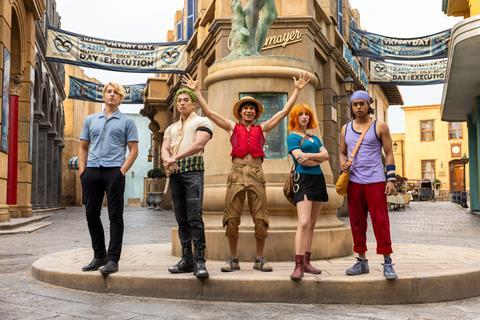South Africa continues to attract international productions thanks to its highly skilled crews and competitive exchange rate.

“South Africa is definitely open for business,” states Tshepiso Chikapa Phiri, CEO and founder of the Known Associates Group of companies, which include a film production development and finance company and a studio in Gauteng. “Our rand still goes a long way. We’ve got great facilities, we’ve got great crews that are highly skilled. We are still a country to be looked at. One thing about South Africa is we are resilient. We know how to ride a wave — and we hope our partners and clients internationally will stay with us.”
Phiri’s Moonlighting Films is filming Paramount Pictures’ adventure fantasy Children Of Blood And Bone, directed by Gina Prince-Bythewood. The project marks the return of Paramount to South Africa after Mission: Impossible — The Final Reckoning. Moonlighting also worked on Gore Verbinski’s sci-fi action adventure Good Luck, Have Fun, Don’t Die, produced by German outfit Constantin, which was shot in Cape Town.
Meanwhile, Netflix filmed the second series of its live-action manga adaptation One Piece, also based in Cape Town. The streaming giant is working on several South African films and series, including romantic comedy Happiness Is, the latest in the Happiness franchise.
Key facilities
There has been continued investment in film infrastructure. New studio facilities are being planned near the Cradle of Humankind archaeological site near Johannesburg and in KwaZulu-Natal.
Recently, however, the Department of Trade, Industry and Competition in South Africa, which oversees the 25% cash rebate system, has been criticised over a reported late payment of claims. But, according to local producers, payments are now being made.
Government-owned body The Industrial Development Corporation of South Africa is supporting the industry through its Youth In Film programme and funding to local producers. Meanwhile, the Department of Home Affairs is trying to make it easier and quicker for international crews to access work visas.
Phiri points out that the success of Prince-Bythewood’s 2022 feature The Woman King reassured Hollywood majors about working in South Africa. “We shot in very challenging locations but we made it seamless, smooth and delivered the production on time,” says Phiri of the film, on which Known Associates was a service producer. “We are great at delivering on these big productions.”
South African producers are also working closely with Dutch counterparts on several features. John Trengove’s The Smell Of Apples shot from April, produced by Cait Pansegrouw and Eric Abraham of Portobello Pictures with Dutch producer Frank Hoeve of Baldr Film. The film is not relying on the incentive. “We did have problems so we secured the money from elsewhere,” says Hoeve.
However, using the co-production treaty between South Africa and the Netherlands, Hoeve and Pansegrouw are setting up a slate of projects to shoot in the country, including South African period vampire film Pale Faces and Thati Pele’s Brace Yourself!.
THE LOWDOWN: South Africa
Financial incentives
The Foreign Film and Television Production and Post-Production Incentive offers 25% of the Qualifying South African Production Expenditure (QSAPE).
An additional 5% incentive can be accessed by productions doing their post-production in South Africa and working with a Black-owned production company. For co-productions, the incentive is calculated at 35% of QSAPE, with an extra 5% available for projects that hire at least 20% Black South African citizens as heads of department. There is talk of the South Africa Revenues Service introducing a new tax credit system that could run in parallel with the incentive.
“Ideally, South Africa would like to get to a space where we have both systems running concurrently,” says Yolanda Ncokotwana, head of industry development at lead public film agency The National Film and Video Foundation.
Infrastructure and crews
South Africa has a strong crew base and experienced service providers, well accustomed to working on big international productions, among them Moonlighting Films.
Size matters
Filmmaking hubs exist across South Africa. Cape Town has the most established studios but there is a strong filmmaking tradition in Durban. Most parts of the country can be reached in an hour or two by plane.
Contact
Yolanda Ncokotwana, head of industry development, The National Film and Video Foundation

























No comments yet